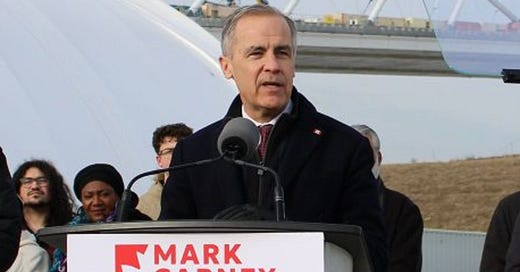Opinion: The yawn of a new day
Federal Liberal Leader Mark Carney is polling ahead ahead of Conservative counterpart Pierre Poilievre, and it’s not just about who’s better equipped to deal with trade war
Imagine you’re invited to a dinner party, and when meal time comes, you discover you’re seated next to an economist. And not just an economist, but a world-renowned financial expert.
Chances are you’ll feel intimidated and ill-prepared to engage in conversation with such a figure. Common ground might feel elusive, and you fear you’ll be subjected to a long speech on economics issues of such complexity that you won’t understand the concepts, let alone the language used to convey them
At that hypothetical social gathering, I wouldn’t even be able to fall back on sports as a subject of discussion, as I am to sports as a fish is to canine agility training.
In other words, Mark Carney strikes me as, well, kind of boring.
Thank God for that.
Drama has been a defining characteristic of politics for a decade or so now, to a degree that’s proven to be incredibly divisive, and I suspect one of the reasons Canadians have responded so positively to the new federal Liberal leader is that he’s much more tame in tone than what we’ve seen as of late.
Obviously, the discourse south of the border has been chaotic to put it mildly, but it’s been explosive, shocking and riveting since the arrival of Donald Trump on the political stage more than a decade ago.
He altered established and unwritten norms long thought to be unbreakable rules for office.
Meanwhile, here at home, Justin Trudeau used charm and progressive positions to power around the same time, but the honeymoon didn’t last too long.
Rhetoric among Canada’s parliamentarians amped up, or at least so it seemed, and it felt as though we were reflecting the divisiveness dominating the discourse in America, though to a lesser degree.
But with the COVID-19 pandemic, sightings of “Fuck Trudeau” flags became all too common, and Conservative politicians seemed all too eager to embrace that wave of anger, even as the government of the day seemed to dismiss or even demonize, to an extent, the vocal minority whose frustrations with mounting challenges couldn’t be ignored.
Against the backdrop of memories of such toxic statements such as “grab her by the pussy,” “lock her up,” “deplorables,” “axe the tax” and so many more, perhaps we shouldn’t be surprised that the more sedate, down-to-business and traditional tone Carney has adopted in his high-speed rise to power has proven to be a refreshing change - or to be more precise, a welcome return to normalcy.
Pundits and voters alike have spoken at length about how the dominant issue of this federal election has been choosing the leader perceived as best suited to take on the American President and his unpredictable policy shifts, aggressive actions and unprecedented antagonism.
But observation of the divergent tones adopted by the federal leaders is undoubtedly playing a part. Poilievre has remained in attack mode, which is understandable for someone challenging an incumbent government (though not one led by an incumbent leader). Had Trudeau remained his chief opponent, it would undoubtedly prove to be a successful strategy.
But Trudeau isn’t his opponent anymore, and neither is it Carney. It’s Trump, and the Conservative leader has mirrored some of the U.S. president’s defining characteristics - populism, anger and outrage, and a combative relationship with the news media.
Even as the current international political climate has completely transformed this election campaign into something no one expected, the Conservatives haven’t pivoted away from those parallels nearly as well as they should have by now.
Carney is far from perfect, but his awkward public moments with reporters and others seem attributable more to someone finding their footing with the public side of politics than a fierce aversion to accountability.
After a decade of drama, someone dull or even dry stands out different. Our current prime minister certainly isn’t devoid of personality, and his accomplishments seem to temper his inexperience in the political realm.
That appears to contrast favourably with Poilievre’s experience being limited to politics and with the thunderous tone of his stump speeches.
Regardless of which party forms government after the next couple of weeks, my hope for the future is a boring one. I want stability, responsibility and sanity - concepts that on their surface sound pretty boring, but certainly seem like something to celebrate in this day and age.
Don MacPherson can be contacted at ftonindependent@gmail.com.





